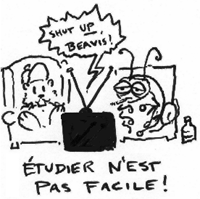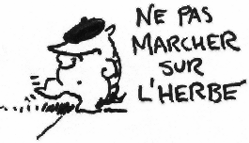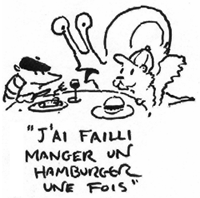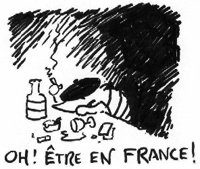Verbs
infinitive constructions, including past and negative
The infinitive expresses the idea or concept of a verb’s meaning, without specifying a specific subject or point in time (tense). In most cases, use of the infinitive in French corresponds to the English. Infinitive constructions may be categorized according to the following uses:
as a noun
The infinitive may sometimes function as a noun. For example, it may be the subject of a sentence. Note that the French infinitive is often translated as a gerund (the ‘-ing’ form of the verb) in English.
| Joe-Bob: Etudier n’est pas facile! | Joe-Bob: Studying is not easy! |
as an imperative (command)
The infinitive may be used to give a written order when there is no specific addressee. You will often see this form on signs.
| Ne pas marcher sur l’herbe. | Do not walk on the grass. |
after verbs
The infinitive is often used directly after these conjugated verbs:
| Verbs of movement: (In this category, the infinitive indicates purpose.) | aller, descendre, partir, rentrer, retourner, revenir, sortir, venir, etc. | |
| Verbs of preference: | adorer, aimer, désirer, détester, préférer, vouloir | |
| Verbs of opinion: | compter, croire, espérer, nier, penser, valoir mieux (impersonal: il vaut mieux) | |
| Verbs of perception: | écouter, entendre, regarder, sentir, voir | |
| Verbs of ability, obligation and necessity: | avoir beau (to do something in vain), devoir, faillir (to almost do something), falloir (impersonal: il faut) pouvoir, savoir |
| Tex et ses amis sortent dîner. | Tex and his friends are going out to have dinner. | |
| Tex compte savourer un bon dîner français, mais Joe-Bob veut manger un hamburger. | Tex is counting on enjoying a good French dinner, but Joe-Bob wants to eat a hamburger. | |
| Edouard les écoute discuter un moment et puis il dit: J’ai failli manger un hamburger une fois. Non, je ne peux pas faire ça, tout de même. Il faut trouver un vrai restaurant français. | Edouard listens to them discuss for a moment and then he says: I almost ate a hamburger once. No, I really can’t do that. We have to find a real French restaurant. |
after prepositions
The infinitive is the verb form generally used after a preposition in French. The infinitive expresses purpose when it is used after pour or afin de. In the case of avant de and sans, the English translation is often a conjugated verb (Before they left), or a present participle (Before leaving), rather than the English infinitive. The infinitive follows the preposition par after the verbs commencer and finir.
| pour or afin de | Tammy arrive pour sortir avec Tex et ses amis. | Tammy arrives [in order] to go out with Tex and his friends. | ||
| avant de and sans | Avant de partir, ils lui demandent de choisir un restaurant. Elle commence par suggérer le nouveau restaurant thaï. Tex et ses copains parlent sans écouter Tammy. | Before leaving, they ask her to choose a restaurant. She starts by suggesting the new Thai restaurant. Tex and his friends talk without listening to Tammy. | ||
| par | Elle finit par comprendre que choisir un restaurant était impossible. | She finally understands that choosing a restaurant was impossible. |
Note that the preposition en is followed by a present participle, not the infinitive. (En sortant, Joe-Bob a dit au revoir. On leaving, Joe-Bob said good-bye.)
![]()
The infinitive may be used to complete the sense of an adjective or a pronoun. Generally infinitives following a noun or adjective are preceded by the preposition de. (Edouard ne serait pas content de manger un hamburger. Edouard would not be happy to eat a hamburger.) However, adjectives and nouns are followed by the preposition à + infinitive to indicate a passive sense or a function: C’est bon à manger. (It’s good to eat.), une salle à manger (dining room), de l’eau à boire (drinking water).
verbs followed by ‘à’ before an infinitive
When the following verbs are followed by an infinitive, the preposition à is required:
- aider à, to help to
- s’amuser à, to have fun at
- apprendre à, to learn to
- arriver à, to succeed in, to manage to
- s’attendre à, to expect to
- chercher à, to try to, to attempt to
- commencer à, to start to
- se décider à, to make up one’s mind to
- encourager à, to encourage to
- s’habituer à, to get used to
- hésiter à, to hesitate to
- inviter à, to invite to
- se mettre à, to start to
- se préparer à, to prepare to
- renoncer à, to give up
- réussir à, to succeed at
- servir à, to be used for
- tenir à, to be anxious to, to be eager to
verbs followed by ‘de’ before an infinitive:
When the following verbs are followed by an infinitive, the preposition de is required:
- (s’)arrêter de, to stop
- conseiller de, to advise to
- se contenter de, to content oneself with
- décider de, to decide to
- s’efforcer de to try hard to, to endeavor to
- essayer de, to try to
- s’excuser de, to apologize for
- finir de, to finish
- mériter de, to deserve, to be worth
- oublier de, to forget to
- permettre (à quelqu’un) de, to permit someone to
- persuader de, to persuade to
- se presser de, to hurry to
- promettre de, to promise to
- proposer de, to propose to
- refuser de, to refuse to
- rêver de to dream of
- se soucier de, to care about
- se souvenir de, to remember to
to avoid the subjunctive
The infinitive is often used in impersonal expressions to avoid the subjunctive when a specific subject is not necessary.
| Edouard: Il est tout à fait barbare de manger des hamburgers! | Edouard: It is completely uncivilized to eat hamburgers! |
in an interrogative or exclamatory phrase
The infinitive may be used in an interrogative phrase or exclamatory phrases to express a dilemma.
| Tex se demande: Quel restaurant choisir? Où aller? | Tex wonders: Which restaurant to choose? Where to go? | |
| Oh! Etre en France! Boire un bon vin rouge! | Oh, to be in France! To drink a good red wine! |
negation of infinitives
Ne pas, ne plus, ne rien, or ne jamais are placed side by side before the infinitive to make it negative. Ne personne, however, straddles the verb.
| Tammy demande aux autres de ne pas se disputer. | Tammy asks the others not to fight. | |
| Tex promet de ne se battre avec personne. | Tex promises not to fight with anyone. |
Pas is sometimes omitted in the negative with an infinitive after the verbs savoir, pouvoir, oser and cesser.
| Tex et ses amis ne savent que faire | Tex and his friends don’t know what to do | |
| et Tammy n‘ose parler. | and Tammy doesn’t dare speak. |
past infinitive constructions
The infinitive of avoir or être plus the past participle of a verb is used after the preposition après to describe a preceding action in the past. Note the past participle agreement in past constructions with être.
| Après avoir suggéré plusieurs restaurants, ils choisissent un restaurant français. | After having suggested several restaurants, they choose a French restaurant. | |
| Après être arrivés au restaurant, Joe-Bob et Corey commandent des hamburgers. Ils sont têtus! | After arriving at the restaurant, Joe-Bob and Corey order hamburgers. They are stubborn! |





